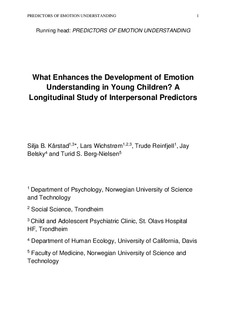| dc.contributor.author | Berg Kårstad, Silja | |
| dc.contributor.author | Wichstrøm, Lars | |
| dc.contributor.author | Reinfjell, Trude | |
| dc.contributor.author | Belsky, Jay | |
| dc.contributor.author | Berg-Nielsen, Turid Suzanne | |
| dc.date.accessioned | 2018-02-12T08:16:57Z | |
| dc.date.available | 2018-02-12T08:16:57Z | |
| dc.date.created | 2015-06-24T10:35:59Z | |
| dc.date.issued | 2015 | |
| dc.identifier.citation | British Journal of Developmental Psychology. 2015, 33 (3), 340-354. | |
| dc.identifier.issn | 0261-510X | |
| dc.identifier.uri | http://hdl.handle.net/11250/2483932 | |
| dc.description.abstract | We studied potential determinants of the development of children's emotion understanding (EU) from age 4 to 6 in a Norwegian community sample (N = 974) using the Test of Emotion Comprehension. Interpersonal predictors included the accuracy of parental mentalization, parental emotional availability, and teacher-reported child social skills. Intrapersonal child factors were child gender and verbal skills. Overall, children's EU increased significantly over time. After adjusting for child gender, age-4 EU, and parental socio-economic status, greater child verbal and social skills and greater parental mentalization each uniquely predicted growth in EU. Results are discussed in terms of theory and research on children's EU and parents' emotion socialization. | |
| dc.language.iso | eng | |
| dc.title | What enhances the development of emotion understanding in young children? A longitudinal study of interpersonal predictors | |
| dc.type | Peer reviewed | |
| dc.type | Journal article | |
| dc.description.version | submittedVersion | |
| dc.source.pagenumber | 340-354 | |
| dc.source.volume | 33 | |
| dc.source.journal | British Journal of Developmental Psychology | |
| dc.source.issue | 3 | |
| dc.identifier.doi | 10.1111/bjdp.12095 | |
| dc.identifier.cristin | 1250432 | |
| dc.relation.project | Norges forskningsråd: 228685 | |
| cristin.unitcode | 7403,9,0,0 | |
| cristin.unitname | Oppvekst og utvikling | |
| cristin.ispublished | true | |
| cristin.fulltext | preprint | |
| cristin.qualitycode | 1 | |
